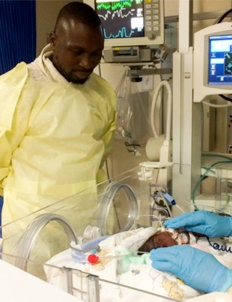South Africa has one of the lowest breastfeeding rates in the world. Not because women do not understand the importance of breastfeeding for their children but because women face a hostile environment to care for their children. This World Breastfeeding Week, observed from 01 to 07 August, the South African Civil Society for Women’s, Adolescents’ and Children’s Health (SACSoWACH) are focusing on creating an environment that enables and supports women to breastfeed successfully.
Due to our current global crises, with the engulfing COVID-19 pandemic and the subsequent economic crash, women are bearing the brunt of job losses. Female-headed households, especially, are experiencing a financial shock,1 adding to the burden of finding food for their families and caring for their children. In South Africa, nearly one in two households are headed by women, skewing the need to provide unfairly on mothers.
Due to our current global crises, with the engulfing COVID-19 pandemic and the subsequent economic crash, women are bearing the brunt of job losses. Female-headed households, especially, are experiencing a financial shock,1 adding to the burden of finding food for their families and caring for their children. In South Africa, nearly one in two households are headed by women, skewing the need to provide unfairly on mothers.
South Africa is known as ‘the fatherless nation’ as it has one of the highest numbers of absent fathers in the world. It is estimated that nine million children in South Africa grow up without fathers.2,3 In a recent media report, even our Springbok captain has had to call on men to support and eradicate the scourge of abuse and violence against women.4

The first step to creating a supportive and safe environment for women and children is the essential provision of food for pregnant women and breastfeeding mothers. We need fathers and empowered men to step up and invest in the future of our society.
Breastfeeding is excellent for infants and young children as a food source, for immunity and for neurocognitive development, and emotional self-regulation.5 “The first step to creating a supportive and safe environment for women and children is the essential provision of food for pregnant women and breastfeeding mothers. Safety and protection for moms, as the life-carrier and carer of children, is non-negotiable,” explains Dr Tshepo Motsepe, First Lady of South Africa, patron of the Coalition, passionate breastfeeding activist and humanitarian.
The high rates of violence in South Africa cannot be ignored. Breastfeeding is associated with less violence in societies.5 Research also shows that 80% of rapists are the product of absent fathers.3 Young men who grow up without involved fathers are more likely to develop ‘hyper-masculine’ behaviours such as aggression and emotional instabilities. In contrast, young women are more likely to develop lower self-esteem and become victims of violence.3 Many hungry and stunted children live in fatherless homes1 where suicide is more likely in these individuals.3


Breastfeeding and paternal support is essential to babies’ growth and development. Pictured above: Tayo George, entrepreneur and husband of Pumla Dlamini (SACSoWACH co-Chair and the South Africa Programme Manager at Vitamin Angels) with their daughter, Titi.
“We need fathers and empowered men to step up and invest in the future of our society. Children are our future; the outcomes we want for tomorrow begins with what we do today. We call on all men to set an example and provide emotional and financial support, as far as possible, for the family and breastfeeding partners. This will help women to breastfeed exclusively and relieve them of the pressure to return to work too early,” explains Patrick Shivuri, Maternal and Child Health Programme Manager from Save the Children and a father himself.
“Food security for infants and young children starts at the breast. Breastmilk is a living food; it protects against many infections that include COVID-19. If we want to protect children’s health, we need to protect and support their mothers,” adds Dr Chantell Witten, nutrition lead for SACSoWACH and lecturer at the University of the Free State.
This has never been more relevant in a time when food is scarce and financial resources constrained. “Reducing Gender-Based Violence starts with protecting, promoting and supporting breastfeeding mothers at all cost. Paternal presence both emotionally and financially is a long-term investment for a healthy and less violent South Africa,” ends Precious Robinson, SACSOWACH chairperson and health advocate from Right to Care.
References:
- van den Berg et al. (2020) https://cramsurvey.org/wp-content/uploads/2020/07/Van-der-Berg-Coronavirus-Lockdown-and-Children-1.pdf
- Fazel, F. (2017) Responding to the challenge of father absence and fatherlessness in the South African context
- Salami, I. and Okeke, C. (2018) Absent fathers’ socio-economic status and perceptions of fatherhood as related to developmental challenges faced by children in South Africa
- Gallan, D. (2020) https://www.theguardian.com/sport/2020/jul/18/siya-kolisi-if-we-educate-our-sons-we-wont-have-to-protect-our-daughters
- Mientka, M. (2013) Breastfeeding Provides Social Advantages Later In Life,.
- Smith, G. (2020) Over 5 million children are still going hungry in SA,










